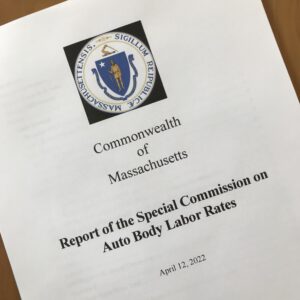
Despite legislative standstill, Massachusetts auto body labor rate bill remains alive
By onAssociations | Legal
A Massachusetts proposal to force insurers to raise Massachusetts’ lowest-in-the-nation auto body labor rate remains alive, even though the $4.6 billion governor’s economic development and tax relief bill that contains the language addressing the labor reimbursement rate has been stalled in a House-Senate conference committee.
Because the bill hasn’t progressed since July, when the formal legislative session expired, “some people think that the bill is dead, but it’s not, not by any stretch,” Evangelos “Lucky” Papageorg, executive director of the Alliance of Automotive Service Providers of Massachusetts (AASP-MA), told Repairer Driven News.
Lawmakers temporarily shelved the economic development bill after state Auditor Suzanne Bump certified that the state must return nearly $3 billion to taxpayers under a 1986 voter-approved law limiting property tax rates.
Legislative leaders signaled earlier this month that they will try to rework the economic development bill into a $1.6 billion fiscal year 2022 closeout budget, according to State House News Service. Bump has certified that the state can afford that amount, in addition to the $3 billion in tax refunds.
Technically, lawmakers have until the end of the year to approve some form of the legislation. Realistically, they’re considered unlikely to do so before the November elections.
The task of the conference committee, composed of three state senators and three state representatives, is to iron out differences in the House and Senate versions of the bill. One of those differences is a version of the auto body labor rate bill, formerly known as House 1111, which is included in the Senate version.
Papageorg said he believes that the bill will be passed before the end of the current calendar year, and forwarded to Republican Gov. Charlie Baker for approval.
“There are so many agencies and segments of the state that are affected by that bill. It’s huge,” he said. “There’s no way it’s not going to be addressed before the end of the year.”
He said AASP-MA and its members are continuing to lobby legislators on behalf of the bill, and “we have been informed our efforts are having an effect. The opposition has also been trying, through robocalls and things of that nature, to spur on their opposition to that language.” That opposition includes the state’s auto insurers.
The legislation would set a minimum hourly labor rate of $55, the first significant increase in more than three decades. The labor reimbursement rate paid by the state’s auto insurers has only risen from $30 to the current average of $40 over that 30-plus-year period.
The bill would also create an “auto body labor rate advisory board” within the state’s Division of Insurance, which would make annual recommendations to the insurance commissioner. The commissioner would be required to set a “minimum hourly rate that insurers shall pay” within 30 days of the advisory board’s report.
The board, which would meet twice a year, would include one representative each of the commissioner of insurance, the attorney general, and the director of the division of standards; three members from the auto insurance industry appointed by the Automobile Insurers Bureau of Massachusetts; three members from the auto repair industry appointed by the Alliance of Automotive Service Providers of Massachusetts (AASP-MA), and one member appointed by the Massachusetts State Automobile Dealers Association.
One member each from the insurance and repair industries would serve as co-chair. They would choose four additional members: one from a vocational-technical school, two from consumer advocacy groups, and one economist with expertise in the insurance industry.
The Senate language incorporated portions of HB 1111 and several similar bills that had been endorsed by the Special Commission on Auto Body Labor Rates in its final report to the Legislature. The commission was formed in late 2021 to address the state’s stagnant labor rate, and examine its effect on consumers, and on the collision repair and insurance industries.
The special commission found that auto body labor rates “must be addressed,” and declared that maintaining the status quo is “not a viable option.”
Under HB 1111, minimum adjustment rates paid by carriers to their insureds would be raised to account for nearly 30 years of inflation with the new rates phased in over two years. It would then be adjusted each year based on the consumer price index for the Northeast Region.
More information
300 repairers demonstrate against Massachusetts’ lowest-in-the-nation labor rate
Images
Featured image: The cover of the final report of the Special Commission on Auto Body Labor Rates, adopted in April by a 10-3 vote. Only the panel’s three insurance industry representatives gave it an unfavorable recommendation. (Dave LaChance/Repairer Driven News)
